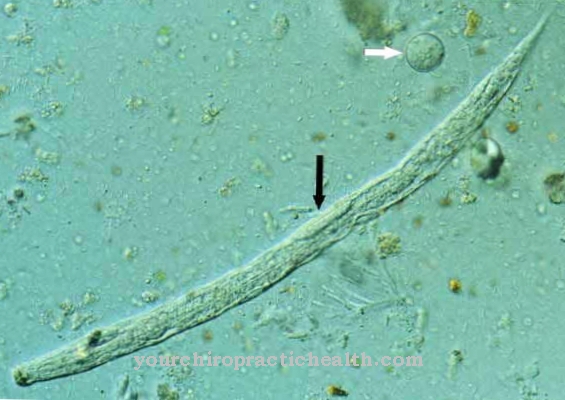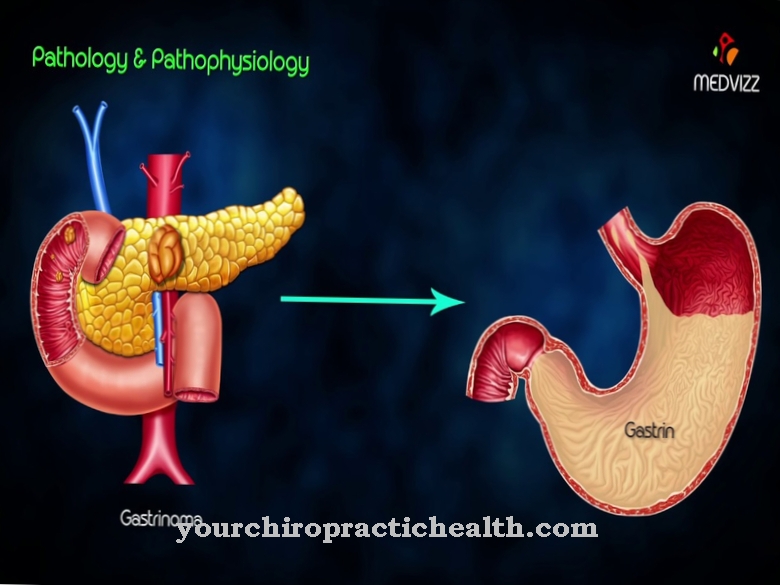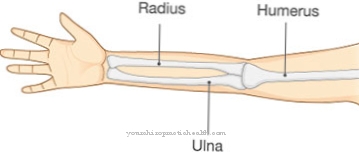The Merry Syndrome is very rare and is caused by a hypothalamic tumor. This creates an imbalance in the hormones that disrupts some regulatory mechanisms in the body. There is no cure for this disease.
What is Fröhlich Syndrome?

© Artemida-psy - stock.adobe.com
The Fröhlich syndrome is primarily characterized by severe obesity with a female fat distribution type and short stature. In addition, there is severe polyuria with an insatiable thirst. Depending on the onset of the disease, the development of sexual maturity of the affected person is impaired. The congenital form of the disease has a decreased intelligence quotient.
In the majority of cases, men are affected. Other names for this syndrome are hypothalamic syndrome, Adiposogenital dystrophia or Babinski-Fröhlich syndrome. It is a very rare endocrine disorder. This can already exist since birth or develop later.
The starting point of this disease is a tumor of the hypothalamus, which also influences the hormone production of the pituitary gland (pituitary gland). At least in part, a genetic component of Fröhlich's syndrome is also suspected.
causes
The cause of the symptoms in Fröhlich syndrome is a tumor of the hypothalamus, the mass of which extends to the pituitary gland (pituitary gland). The disease is very rare and closely related to the particular location of the tumor. This position impairs both the hypothalamus and the pituitary gland.
The hypothalamus is part of the autonomic nervous system and its most important central switching point. There are various homeostatic control loops that maintain the balance of the internal environment in the body. This enables the organism to adapt well to external and internal loads. It has been found that even the smallest disturbances in this area have a major influence on the viability of the organism.
One of the tasks of the hypothalamus is to maintain the balance (homeostasis) between body temperature, blood pressure and osmolarity, to regulate the consumption of food and water, to regulate the biological rhythm and sleep, and to control reproductive and sexual behavior. Different regulatory hormones of the hypothalamus are responsible for this.
These hormones include TRH (thyrotropin-releasing hormone), CRH (corticotropin-releasing hormone), GNrH (gonadotropin-releasing hormone), GHRH (growth hormone-releasing hormone) or somatostatin (growth hormone-inhibiting hormone). All of these hormones regulate the production or inhibition of certain hormones with specific tasks.
TRH controls the formation of thyroid hormones in the thyroid gland. CRH is responsible for the production of cortisol, the sex hormones and aldosterone in the adrenal cortex. GRnH controls the production of LH and FSH, which in turn are responsible for the growth of the gonads and the maturation of sperm and egg cells. While GHRH promotes the release of growth hormone, Somastatin inhibits its release.
In addition to the hormones mentioned, prolactin and vasopressin are stored in the hypothalamus. Prolactin controls the production of milk in the mammary glands. Vasopressin is responsible for the balanced water balance in the organism by regulating the excretion of water in the urine via control processes. The hypothalamus also controls the production of the hormone leptin, which causes the feeling of satiety.
Leptin is usually released with the increase in fat tissue, so that a feeling of satiety is achieved if the nutritional status is good. This complicated regulatory system can explain why the typical symptoms of Fröhlich's syndrome can develop when there is a mass in the area of the hypothalamus, which also affects the pituitary gland.
Symptoms, ailments & signs
The typical Fröhlich syndrome is characterized by such symptoms as pronounced obesity with a female fat distribution pattern, short stature, intelligence deficits and underdevelopment of the gonads. Food intake is greatly increased because there is no feeling of satiety. Puberty is delayed or absent.
There are also visual disturbances, headaches and polyuria. The polyuria can extend to extreme diabetes insipides. In extreme forms of diabetes insipides, the body can lose up to 20 liters of water a day, which of course has to be compensated for by drinking. So the patients suffer from a constant feeling of thirst and hunger.
Diabetes insipides is caused by a deficiency in the hormone vasopressin. Vasopressin is stored in the hypothalamus and released when needed. The disorder of the feeling of satiety is caused by the dysregulation of the production of the hormone leptin. There is a leptin deficiency, which leads to a constant feeling of hunger.
The release of sex hormones is also reduced, so that the sexual glands (gonads) cannot mature. The short stature is due to a lack of growth hormone, which is caused by the increased formation of somastatin. If the disease only occurs in adulthood, the already formed gonads regress. This can lead to infertility.
diagnosis
The doctor can often make the suspected diagnosis of Fröhlich syndrome based on the symptoms of the disease. Imaging such as CT can confirm a hypothalamic tumor.
Complications
Unfortunately there is no cure for Fröhlich syndrome. In most cases, this leads to short stature and obesity. Children in particular can suffer badly from Fröhlich syndrome as they are teased and bullied because of the symptoms. This leads to social restrictions and psychological problems.
Most of those affected go through puberty completely. Food intake is also increased because the feeling of satiety is absent. Diabetes often develops due to obesity. Fröhlich syndrome has a negative effect on eyesight and at the same time leads to severe headaches. The patient's everyday life is significantly restricted.
The suspension of puberty also does not release sex hormones. It is not possible to treat Fröhlich syndrome or to cure it completely. The main aim of the treatment is to reduce the symptoms of obesity and to reduce weight. In many cases, the disease progresses positively.
Life expectancy is reduced due to being overweight. Heart and lung complications can occur. The short stature can be treated by surgical interventions, although a complete cure is not possible. Typically, the patient has to live with the symptoms his entire life.
When should you go to the doctor?
If there is severe weight gain without a comprehensible and explainable reason, a doctor should be consulted. If there is no decrease in weight despite a diet and normal food intake, the observations should be discussed with a doctor.
If you do not feel full or if there are repeated strong fluctuations in weight, this should be discussed with a doctor. A noticeable short stature is always considered unusual and should be examined. Parents who perceive their child to be of reduced intelligence in direct observation and comparison with children of the same age should have this clarified by a doctor.
An unusually strong urge for fluids is also considered a reason to speak to a doctor. If the headache persists, a feeling of pressure inside the head or impaired vision, a doctor's visit is necessary. If, despite all efforts, there is an unfulfilled desire to have children, a check-up with a doctor is recommended.
If the person concerned suffers from emotional or mental impairments, it is advisable to ask a doctor or therapist for support. A depressed mood, social withdrawal or the loss of zest for life are considered worrying and should be clarified. If there is a reduced performance or if professional or private obligations can no longer be fulfilled, a doctor's visit is necessary.
Doctors & therapists in your area
Treatment & Therapy
A causal treatment of Fröhlich's syndrome is currently not possible. Therapy only needs to be symptomatic. This includes promoting mental development and controlling eating behavior through psychotherapeutic measures.
Weight reduction should also be sought through dietary measures. The disproportion between growth hormone and sex hormone leads to growth disturbances, which in individual cases may require surgical intervention.
Outlook & forecast
Regardless of whether symptomatic treatment is given or not, Fröhlich syndrome is incurable. This way, all symptoms will persist for the rest of life. By treating the symptoms, however, the course of the disease can be alleviated, which leads to a better prognosis with regard to quality of life. This applies in particular to the lifestyle of medically indicated interventions in the event of imminent damage to the organs.
For example, short stature can be countered with orthopedic measures. Misalignments of joints and bones (particularly common in the thigh area) can usually be corrected. This way, postural damage and complaints can be dampened. In addition, the increased risk of developing diabetes can be countered by reducing weight. Overall, the quality of life is better for people with Fröhlich's syndrome, who only develop latent obesity.
The overall prognosis varies from case to case. In principle, a controlled eating behavior is associated with fewer complications than an uncontrolled one. In addition, those affected can be and remain socially active thanks to promotional measures. In most cases, however, it is the case that those affected are sterile. Accordingly, the desire to have children is denied. This is especially true if the Fröhlich syndrome has been present since birth.
prevention
There are currently no measures to prevent Fröhlich syndrome. The causes for the development of the hypothalamus tumors are largely unknown. Only the symptomatic treatment of individual symptoms of this disease, such as extreme obesity, can prevent further secondary diseases.
Aftercare
With Fröhlich syndrome, there are usually no special options for follow-up care available to those affected. First and foremost, direct medical treatment is necessary to remove the tumor, although complete healing is not possible. The life expectancy of the person affected may therefore also be restricted by the syndrome.
The earlier the syndrome is recognized, the better the further prognosis. The treatment of Fröhlich's syndrome can only be carried out symptomatically, since a causal treatment is not possible. The movement of the person affected can be increased again by means of physiotherapy measures. In many cases, the exercises from this therapy can also be performed at home to accelerate healing.
Some complaints can only be treated with surgery. After such an operation, the person concerned must always take it easy and rest his body. Efforts should therefore always be avoided, and stressful situations should be avoided as far as possible. It is not uncommon for the parents of the affected children to be dependent on psychological treatment, whereby the support of one's own family and friends is particularly useful.
You can do that yourself
Patients with Fröhlich's syndrome can optimize their weight by regulating their food intake. It is helpful if your own weight is within the normal range of the BMI.
With a vitamin-rich and balanced diet and sufficient exercise, obesity can be reduced. It is advisable to draw up an overview of the planned food intake per day. At the same time, keeping a diary has proven its worth in which all food consumed from meals to snacks or sweets is documented.
Since people with Fröhlich's syndrome have a reduced intelligence quotient, a caregiver should have an overview of the daily routines and structure. This ensures that the patient does not acquire additional food that is not beneficial for his health without being aware of the consequences.
To avoid social isolation, relatives should encourage and support contact with other children. The exchange with other sick people and their relatives can be perceived as helpful. Hints and tips for dealing with the Fröhlich syndrome in everyday life can be given to each other. This promotes the quality of life and general well-being. In addition, relaxation methods for coping with stress have proven effective. These can be carried out together with the patient as far as possible.













.jpg)

.jpg)
.jpg)











.jpg)